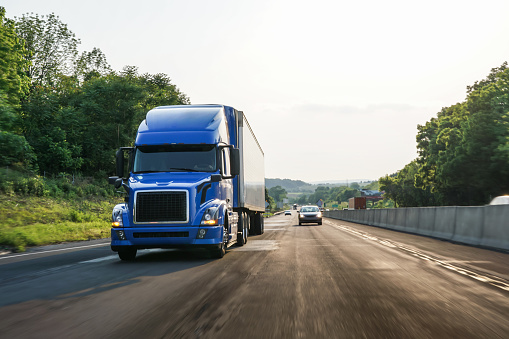Have you ever found yourself on a multi-lane interstate, surrounded by big trucks or 18-wheelers? Did it make you feel nervous and claustrophobic?
You have good reason to be apprehensive. Large trucks only make up 4.3 percent of all vehicles on the road, but are involved in 22 percent of fatal multiple-vehicle crashes. In other words, large trucks are consistently the most dangerous vehicles on the road.
Large Trucks Are the Most Dangerous Vehicles on the Road
Semi-trailer trucks can weigh 20-30 times more than an average car. They make wide turns, require about 40 percent more time to stop than a consumer car, and have large blind spots.
A total of 4,102 people died in large truck accidents in 2017. Three-quarters of those deaths involved tractor-trailers.
It would be difficult to forget the images of the fiery crash on I-70 in April 2019, when a semi-trailer truck traveling 85 mph crossed a median into stopped traffic. The accident, which may have been caused by a brake malfunction, involved 28 vehicles, including three other semis. It resulted in four fatalities and at least 10 injuries.
If you drive expressways and highways, it’s impossible to avoid big trucks. So we put together some tips to help you drive more defensively and feel (hopefully) comfortable when you’re sharing the road with oversized vehicles.
Tips for Safely and Comfortably Sharing the Road with Big Trucks
- STAY ALERT. This is always the most important safe driving tip – regardless of the size of vehicles around you. Don’t text and drive. Likewise, don’t talk on the phone while you’re driving. Don’t reach for something on your passenger seat or floorboard. Keep your eyes on the road, rather than on your children in the backseat. Distracted driving is the leading cause of accidents.
- Stay back. It’s always important to follow at a safe distance, while keeping in mind that big trucks require almost twice as long to stop as other vehicles. Meaning, if a large truck is going 65 mph, it could take them up to two football fields to stop. A good rule of thumb is to give a big truck about 20 car-lengths of a cushion. If you can’t see the driver’s face in the mirror, they probably can’t see you.
- Give trucks space to turn. Big trucks make wide turns, so you may just have to be patient. It’s better to get where you’re going late than risk an accident!
- Pass quickly. If you’re passing a large truck, hug the shoulder and speed up. You don’t want to linger in any blind spots. A truck’s biggest blind spot is on the right, so avoiding passing on the right. The Federal Motor Safety Administration has a great illustration of a truck’s blind spots.
- Give a signal, and don’t cut off a big truck. Remember, large trucks need longer reaction times. Make sure you can see the entire front of a truck in your rearview before merging in front of it.
- Dim your brights. Bright lights can blind any driver, but this effect is amplified for big truck drivers. The lights reflect off of their large side mirrors and can cause up to two seconds of blindness. This rule applies if you’re coming up behind a truck or facing it from the opposite direction. Your lights should be dimmed if you are within a football field’s distance of a large truck.
- Let the truck pass. If a semi or other large truck is trying to pass you, slow down to make it easier for them to get around you.
- Don’t try to pass in heavy rain. Back-spray from the wheels of a large truck can completely block your windshield, making it impossible for you to see. And when it’s raining, both stopping and starting will take longer. Be patient, slow down, and follow at a safe distance until the rain passes.
- Trust your nose. Colorado’s steep grades are hard on brakes. If you smell burning rubber while driving near a big truck, absolutely do not try to pass. Stay as far behind the truck as possible. That burnt smell may mean that the truck’s brakes are failing. Failing brakes may cause a truck to accelerate uncontrollably.
Need to beef up your car insurance? Get in touch with a local agent today.

